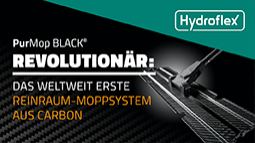- Trade fair
Anuga FoodTec 2024: A guarantee for safe food
In March 2024, Anuga FoodTec will show how hygienic design and innovative technologies can contribute towards efficient cleaning and thus towards safer food.
Process hygiene is one of the most important themes at Anuga FoodTec 2024. The linchpin of process hygiene is hygienic design, in other words the easy-to-clean design of parts and production systems. Food and beverage producers, who want to guarantee that their plant is the best from an "easy-to-clean" point of view, will be able to find a multitude of solutions at the Cologne fair grounds - ranging from process instrumentation, to conveyor systems in washdown execution, through to fully-automatic CIP systems. The events and congresses scheduled to take place at the fair grounds in Cologne from 19 to 22 March 2024 will also convey related know-how.
The easy-to-clean design of parts and components is a key requirement in the hygiene-critical environment of food production. The theme in itself is nothing new. For almost 35 years the European machinery directive has demanded that a system is constructed in such a way that the materials that come into contact with food can be cleaned before every usage. This is primarily down to the machine builders and their technology partners, because whether it is a question of a pump, valve or flow meter: Changes to built-in components or the machinery itself are hardly possible at a later date and, if so, involve high costs.
As such, hygienic design is at the top of the agenda for the companies exhibiting at Anuga FoodTec - but not only because it is a legal obligation. Namely, the cleanability has a major influence on the process safety. Even the slightest contaminations in the production and filling processes can lead to quality reductions or product recalls. The material itself is an important aspect of hygienic design. Process plants made of stainless steel dominate the scene in the food industry today. High-alloy steel with a roughness lower than 0.8 micrometres is considered to be the ideal hygienic material, but does not guarantee easy cleanability on its own. Manufacturing an "old design" from stainless steel doesn't help.
Constructions without corners and edges
A glance at the guidelines of the European Hygienic Equipment Design Group (EHEDG) makes it clear immediately: How clean a system really is after the cleaning process depends above all on the state of the surfaces that come into contact with products, the cleaning of which has to be carried out automatically. The most important design principles include the avoidance of horizontal surfaces, sharp edges and corners - because only if the cleaning process can be carried out residue-free, is it possible to rule out contaminations in food and cross-contaminations following a product change. In the case of closed processes like those typical for the beverage and milk industry, one should make sure that dead spaces, where microorganisms can accumulate, are avoided. The risk of contamination of the environment plays an important additional role in the case of the open processes of the meat and bakery industry.
The materials that don't come into contact with products also have to be easy to clean and the surfaces should be smooth. For instance, a consistent seamless design and overhanging 30-degree angles with horizontal drip edges ensure that cleaning liquids drip off quickly and reliably. Beyond this a multitude of further constructive measures guarantee that the machines withstand high-pressure cleaning even at high temperatures and when using chemical cleaning agents. For instance for drives and control cabinets this means they have to comply with protection class IP69K.
Automatic cleaning without dismantling
The biggest challenge for the food manufacturers is coordinating the lines that produce in batch mode operation with the cleaning process. Anuga FoodTec is thus also focusing on innovative technologies for the automation of the cleaning as well for monitoring the level of cleanliness achieved. For example nozzle plates can be attached at strategic places on a conveyor system to ensure that every centimetre of the conveyor belt is disinfected to avoid microbial growth. Furthermore, the implementation of inline measuring devices allows the control of pre-programmed washdown processes and contributes towards the reduction of cleaning times, production losses and resources. The downtimes are also reduced - without exception advantages that also occur as a result of monitoring a CIP process (cleaning-in-place process) and that also lead to an optimisation of the heat, cleaning agent and water consumption, all of which are points that the key theme of Anuga FoodTec addresses.
CIP enables a fast and efficient cleaning of systems without them having to be dismantled. Depending on the respective products manufactured, the cleaning is carried out by alternating between rinsing the system using water and acidic or alkaline solutions. CIP systems remove product-related deposits and contaminations and enable a complete and hygienic cleaning of pipes, pumps, valves, tanks or filling systems. And here at the latest the hygienic design plays a key role again: Since dead spaces cleaning agents get left behind in would impair every CIP process, regardless of however optimised it is. Visitors will find out at the fair grounds in Cologne, how they can sustainably optimise their CIP cleaning and upgrade their existing machines for the future by implementing the optimal technology.
Looking ahead to tomorrow: Self-learning cleaning robots
Due to its extensive offer along the entire process chain, Anuga FoodTec is the ideal information and procurement platform for all aspects to do with the production of food and beverages. Whereby the focus doesn't purely lie on the current requirements, because through the integration of artificial intelligence (AI), it should be possible in future to carry out the cleaning process even more efficiently. Researchers are developing a mobile platform here for the cleaning of process systems and production halls. Equipped with a self-learning AI system and smart sensors, the autonomously operating robots can recognise the actual degree of contamination and choose the optimal cleaning procedure based on this data.
Organised by Koelnmesse, Anuga FoodTec is placing the emphasis on the key theme Responsibility. The professional and industry sponsor is the DLG, the German Agricultural Society.
Koelnmesse GmbH
50532 Köln
Germany









